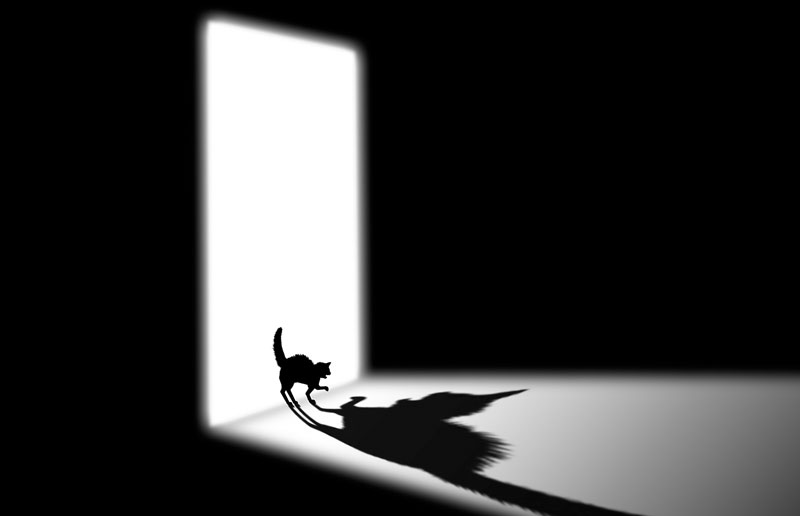As I was walking home the other day, a black cat appeared from the shadows and crossed my path. A superstitious person might have taken this as a bad omen, but as a cat lover, I took it as a potential to make a new furry friend. It quickly scampered under some bushes never to be seen again, but I did discover something else interesting in that moment…the topic of today’s blog post!
Have you ever wondered about how superstitions came to be? Some of them might surprise you. Knock on wood, cross your fingers and scroll down to learn the origins of 13 superstitions:
1. A black cat crossing your path is a bad omen…
This superstition dates back to the Middle Ages in Europe, where a black cat was thought to be a witch’s companion or perhaps a witch herself. If one crossed your path, it meant that the devil was watching you. In Ancient Egypt, however, all cats were considered sacred, and nowadays black cats are viewed as good luck in Japan, Scotland and many other countries around the world.
2. Stepping under a ladder brings bad luck…
Ancient Egyptians used triangles to symbolize the gods Isis, Osiris and Horus. A ladder leaning against a wall creates a triangle shape, so to walk under it was viewed as an affront to the gods and an invitation for misfortune.
3. Open an umbrella indoors and bad luck will “rain” on you…
This one is believed to be a superstition that stemmed from good advice. In the 18th century, umbrellas had sharp metal spokes and would open quickly using a spring mechanism, so if one was opened in tight quarters, it could hurt other people or damage something precious nearby.
4. Breaking a mirror results in 7 years back luck…
Ancient Greeks believed that if your reflection was distorted when you look in a mirror submerged in water that you would most likely die from whatever ails you. Ancient Romans believed in seven year cycles, so if one were to break a mirror, resulting in a distorted reflection, they could expect seven years of ill-health and misfortune. Better than death, I suppose!
5. Holding your breath past cemeteries…
Many cultures throughout history connected breathing with one’s soul. In fact, the word “spirit” comes from the Latin word “spiritus,” meaning “breath.” To hold your breath while passing a graveyard was thought to protect your soul from escaping, as well as prevent other spirits to enter and possess you.
6. Saying “God Bless You” when someone sneezes…
Just like #5, this relates to the connection between breath and one’s soul. For centuries, people considered a sneeze as your body expelling evil spirits, or your soul itself trying to escape. In either case, a prompt blessing in response to it became commonplace.
7. Knocking on wood for good luck…
Knocking on wood began with the pagans in ancient Europe, who believed that spirits lived in trees. Knocking on wood called upon them to protect you from misfortune.
8. Tossing salt over your left shoulder…
This dates back to 3500 BC when the Sumerians considered it “bad luck” and wasteful to spill such a prized commodity. To throw a pinch over the left shoulder was an attempt to reverse that luck and convey to others that it was an accident.
9. Breaking a wishbone…
Whoever gets the bigger half gets a wish, but that wasn’t always the case. The concept of a wishbone originated thousands of years ago with the Etruscans, who used chickens to predict the future. They would also carry the bones around for good luck and make wishes upon them. Once the Romans conquered the Etruscans, the tradition was upheld, but it is believed that people started breaking the bones so that more people would have a chance at good fortune. Fun fact: phrases like “lucky break” and “give me a break” stems from this tradition.
10. Cross your fingers…
Pagans in ancient Europe used the symbol of the cross to signify unity, and they would make their wishes where the cross intersected, which was thought to have a concentration of good energy. This tradition evolved into crossing your finger with another person’s to share good luck with them, and eventually doing it to yourself.
11. Find a penny, pick it up…
Despite it being a catchy rhyme nowadays, this action is thought to stem from ancient times where metals were thought to ward off evil spirits. If you found a piece and held on to it, you would be protected from harm. Then, when metal coins started to be used as currency, there was an added bonus to finding one!
12. Horseshoes bring good luck…
For centuries, iron was considered a magical material due to its strength and ability to withstand fire. Since horseshoes were originally made of iron and relatively easy to acquire, it is believed that the custom of hanging a horseshoe in a home would deflect evil and in turn bring good fortune.
13. The dreaded number 13…
This has its roots in Norse mythology, where 12 gods were invited to dine in Valhalla and Loki, the trickster god, crashed the party, raising the number to 13. While the others were trying to kick him out, the god Baldr was killed. In Christianity, Judas was the 13th guest at the Last Supper, which took place on a Friday, hence unease around Friday the 13th. Fun fact: the fear of the number 13 is called “triskaidekaphobia.” Try saying that 13 times fast!
I hope you enjoyed these fun and freaky facts on superstitions. I always say “bless you” whenever I hear a sneeze, but more for manners than believing in the superstition behind it! Do you partake in any of the superstitious activities I listed? Do you have superstitions not on this list? I’d love to hear from you in the comments!
If this post left you wanting a few more tingles up your spine, make sure to visit The Bradford Exchange Online to see our selection of Halloween home decor, gifts and more that’s sure to share thrills and chills. Fair warning: you may see some black cats and spooky spirits, but don’t worry, it’s all in good fun!
Thanks for reading and please share this post!
13 Surprising Facts on Superstitions by Beth Simon
